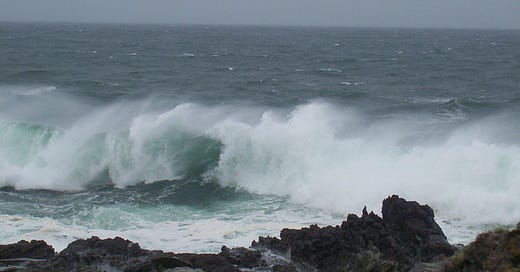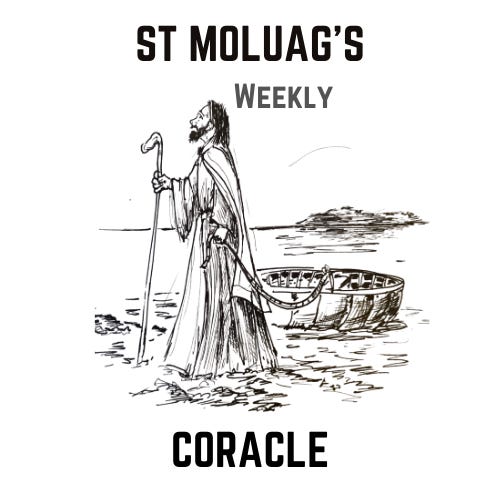I went to speak to my Grandmother about Scotland’s old All Souls Day traditions and, with a rather playful gleam in her eye, she told me, ‘I’ll tell you a story about someone my father knew. My father told it to me and it’s true.’ (Disclaimer: this does not also mean that the story is definitely not published somewhere else - neither my granny nor I would know for sure!)
At some point last century a young artist was travelling to Islay. It was around the time of Halloween, All Saints and All Souls, and when the young man disembarked from the ferry he was met by a group of local young islanders, the ‘lads’, all dreadfully disappointed because their mail-order of dressing-up masks for guising had not arrived. In those days, you see, my Granny explained, it was the young men and not the children that dressed up and went around the houses. Anyway, the young artist said not to worry, he could make the boys some masks. And sure enough there was a roll of cloth used to wrap up cheese, which the young man proceeded to cut face masks out of. And he pulled out his paints and painted them.
The young men of the island were so pleased with the artist’s handiwork that they invited him to go out guising with them. They had a great old time, going around the houses. Finally they arrived at the last house, and knocked at the door. Only when the door was being opened did the young artist realise that all the others had run away and left him standing there alone. An old man came out and invited him to come inside, offering him a seat. He sat down by the fire and started to feel a little bit embarrassed to be sitting there in his mask and hood, so he took it off, and began to apologise for his rather silly get-up. At this point his host, who had erstwhile been quite at ease, took enormous fright and ran and hid around the corner, exclaiming, ‘I thought you were a dead man, not an alive one!’
It’s a good yarn, quite a funny story, and I enjoyed hearing from the true story-teller that is my grandmother, but I didn’t at first note the important truths she found in it.
‘You see’, she said to me as though pointing out something significant, ‘he believed the dead were still really there.’
Perhaps Scotland’s earlier Catholics may have got the November feast days a bit muddled with whatever local superstitions held them to keep Halloween too, but they were still fully aware - having been catechised by countless saints - of the significance of Christ’s life, death and resurrection for their lives. We only need to read some of the hymns in the Carmina Gadelica for beautiful evidence that our Scottish Catholic forebears had a full awareness of what happens when you die.
This November the Church provides us with the invitation and opportunity to visit the graves of our deceased and intercede for their needs, to help them to rejoice forever in the presence of God. How wonderful! My semi-catechised and rather Presbyterian younger self always found the idea of praying for the dead rather morose and dull. This year I am being helped to see the great gift this month for the dead offers us. My family has been quite recently bereaved - my Granny’s brother, my great-uncle, who has lived in our village as long as I can remember, passed away in March. But my granny, who keeps a large framed photograph of him in the kitchen, knows that, ‘he’s still here’. Another witness I have seen of this real belief in eternity is in my fiancé[now married], whose mother recently passed away. He and his siblings miss her, but have no doubt in her continuing presence with them in Christ.
Are you aware, today, now, of the full implications of Christ’s life, death and resurrection? I have been challenged this week by the coming Sunday’s readings, to ask this question of myself. St Paul tells us: ‘We want you to be quite certain, brothers, about those who have fallen asleep, to make sure you do not grieve for them, as others do who have no hope. We believe that Jesus died and rose again, and that in the same way God will bring with him those who have fallen asleep in Jesus’. (1 Th 4:13-14) Wow! This is radical. I am called not to grief, not to fear loss, but to joy and hope in the resurrection. I am called to recognise that the ‘death’ of someone is really a step into fuller life with Christ. I can recognise, as I pray the liturgy of the hours, or attend mass, that I am present not only with God but will all the saints at the heavenly banquet.
I am challenged by recognising this reality: does my life accord with my so-called ‘belief’ in salvation through Christ at death? Does my fear of ‘fitting in’ with others around me, or of ‘not wanting to offend’ people, or simply my attachment to things of this world, inhibit my belief in the good news of the resurrection - news that many people urgently need to hear! Most important of all: am I prepared to meet the bridegroom at the heavenly banquet upon my own death? Or, am I more like the foolish virgins, eager but not serious, not committed enough to ensure that I will be ready and waiting in hope?
Contrary to what the world increasingly is trying to convince us of: dying is not the end. I am a bridesmaid, and my life is a preparation to meet the bridegroom at the moment of my death. My life is transformed, revolutionised every time I recognise this fact. And I pray the hymns of our forebears, who recognised this too, and can help us along our way:
Thou great God of salvation
Pour Thy grace on my soul
As the sun of the heights
Pours its love on my body.
I must needs die,
Nor know I where or when;
If I die without thy grace
I am thus lost everlastingly.
Death of oil and of repentance,
Death of joy and of peace;
Death of grace and of forgiveness,
Death of Heaven and life with Christ.
Hymn, translated from the Gaelic,
Carmina Gadelica, Vol.3, p. 373.
Collected by Alexander Carmichael, published 1900.
By Rebecca Blakey. Originally published in November 2021



